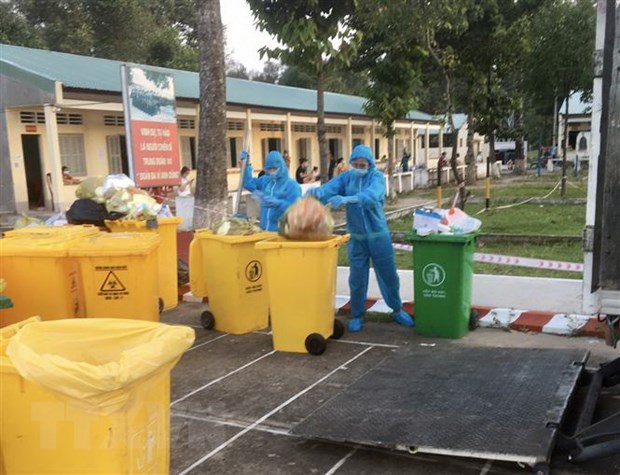 Society
Society

The environment sector, especially in localities severely hit by the COVID-19 pandemic, has strengthened measures to protect environmental workers from being infected with SARS-CoV-2 when collecting waste.

|
| Environmental workers collect waste in a quarantined area in the southern province of Bình Dương.— VNA/VNS Photo Huyền Trang |
HÀ NỘI — The environment sector in many localities, especially those severely hit by the COVID-19 pandemic, has strengthened measures to protect environmental workers from being infected with coronavirus when collecting waste.
In Hà Nội, Tống Việt Dũng, deputy director of the Urban and Industrial Environment No 13 Joint Stock Company, said the company provided enough protective equipment for its environmental workers to ensure their safety.
The company had also constantly disseminated regulations on pandemic prevention and control, he said.
Lê Thị Linh, an environmental worker of the company, said she was always equipped with protective clothing when she did her job. Linh added that she had already received one dose of the COVID-19 vaccine.
In HCM City, Huỳnh Minh Nhựt, director of HCM City Urban Environment Company Limited, said the company not only equipped personal protective equipment but also instructed environmental workers on how to obey regulations on anti-pandemic prevention in each location that they had to collect waste.
The company allocated over 300 environmental workers to collect waste in lockdown areas three shifts daily, he said.
The environmental workers had to work very hard to ensure all the waste would be transported to treatment areas in order to minimise the risk of cross infection in lockdown areas, he said.
However, because the amount of waste was large and the collection sites were far away from each other, this put great pressure on the environmental workers, he said.
Nguyễn Văn Thiền, chairman of the Board of Directors of Bình Dương Water Supply Sewerage Environment Ltd., said the company’s waste treatment branch had about 800 employees.
Thiền said waste transported to the company would be treated by specialised machines and an automatic disinfecting and burning system.
The most dangerous stage was when workers had to collect waste from lockdown and quarantined areas, he added. Therefore, the company had provided protective clothing to environmental workers to ensure their safety during waste collection.
The company also periodically conducted COVID tests for environmental workers.
The company has applied the "three on-site" model, which involves eating, sleeping, and working without leaving and aims to keep operation and production going while meeting COVID-19 control and prevention measures.
Under the model, the company arranges accommodation for environmental workers at the company. The accommodation is disinfected three times daily to ensure safety.
Phùng Chí Sỹ, director of the Environmental Technology Centre, said environmental workers who directly collected waste in areas where COVID-19 patients lived or were treated, played an important role in controlling and preventing the spread of the pandemic.
So, they needed to be classified as a frontline group and given priority for vaccination, he said.
Sỹ also said that waste in areas with cases of COVID-19 infection as well as lockdown and quarantined areas should be carefully sorted to reduce pressure on environmental workers and treatment plants.
Nguyễn Thượng Hiền, deputy head of the Việt Nam Environment Administration under the Ministry of Natural Resources and Environment, said environmental workers had to collect and transport waste daily.
They were a very-high risk group for COVID-19 infection, he said.
Therefore, the ministry already proposed to the Government that environmental workers should be given priority for vaccination as well as regular tests to ensure their safety.
More waste discharged
In Hà Nội, the total amount of waste has increased by about 30 per cent, equal to 7.5 tonnes per day, compared to pre-pandemic levels.
The company has sharply increased the frequency of waste collection in quarantined and lockdown areas.
The company’s waste treatment factory now operates eight hours daily instead of five as before. The waste is transported to the factory for treatment following a route that avoids going through residential areas to minimise the spread of the pandemic.
In HCM City, the local Natural Resources and Environment Department said the amount of waste discharged in field hospitals and quarantined areas was 78 tonnes daily.
In Bình Dương Province, the amount of waste discharged in field hospitals and quarantined areas is about 70 tonnes daily.
In response to the situation, the environment ministry has cooperated with the Ministry of Health to issue technical guidelines to instruct localities on how to treat waste related to SARS-CoV-2 right after the pandemic hit the country. Such waste will be treated as hazardous.
In July, the ministry continued sending document 4119/BTNMT-TCMT to ask localities nationwide to strengthen measures to deal with waste related to COVID-19.
The ministry also sent the localities the list of 80 facilities nationwide that are eligible for hazardous waste treatment. — VNS